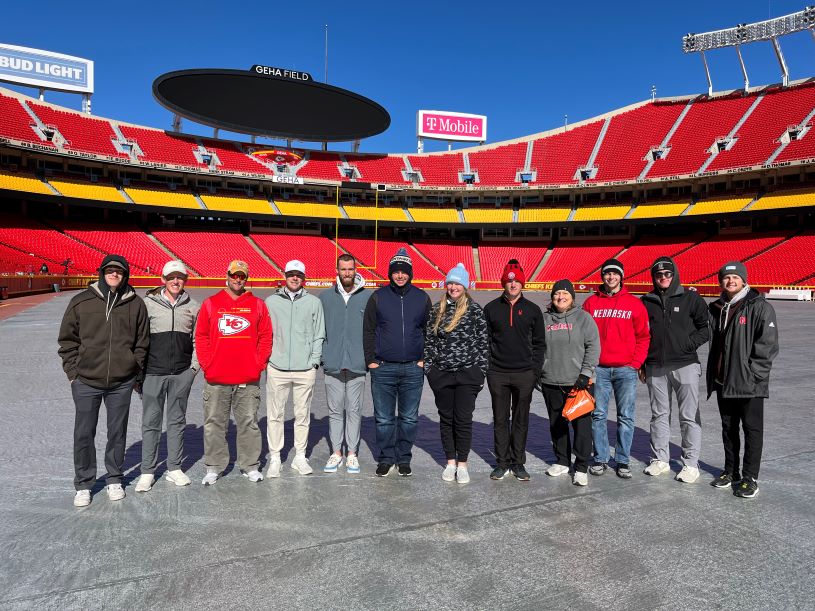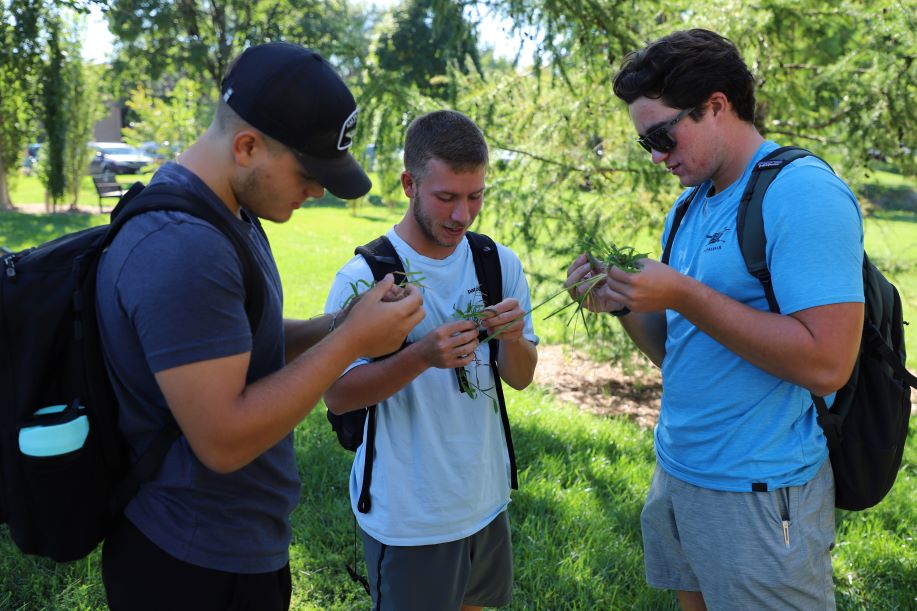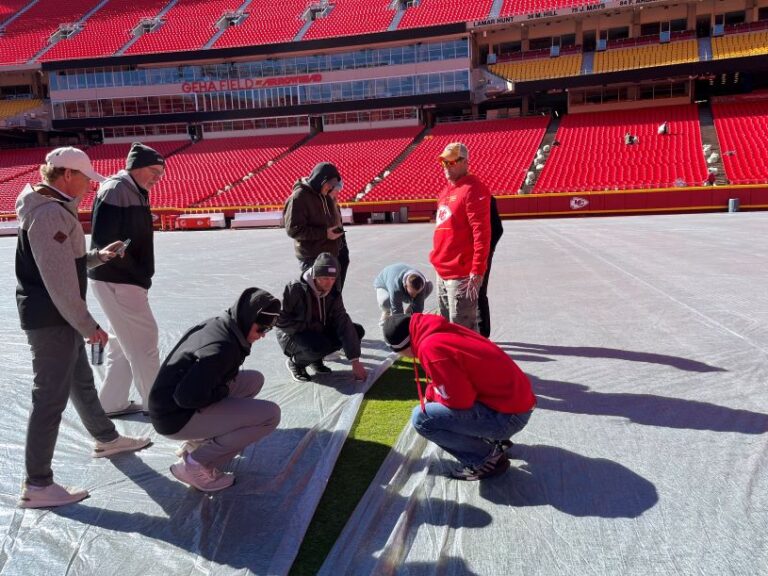The following is the next in our series delving into colleges and universities that offer programs devoted to turfgrass management, turfgrass science, and related disciplines. In this edition, we examine the turfgrass program at the University of Nebraska-Lincoln.
University of Nebraska-Lincoln
The Plant and Landscape Systems major at the University of Nebraska-Lincoln (UNL) aims to educate and develop professionals to design and manage complex horticultural, landscape and turfgrass systems. The three primary options for this major are horticulture, landscape design and management, and turfgrass science and management. Additionally, students complement their program of study with two additional areas of professional specialization provided through emphases and/or minors. The turfgrass science and management program at UNL is a nationally recognized program with students highly sought after for internships and full-time positions.
According to Anne Streich, professor of practice and advisor, Agronomy and Horticulture, University of Nebraska–Lincoln, in 2017, the UNL Agronomy and Horticulture Department went through an academic program review that ultimately resulted in the creation of a new major that would encompass all of the disciplines to retain traditional students, but also draw in new students.
“Today we have turfgrass science and management, landscape design and management, and horticulture under the Plant and Landscape Systems major,” said Streich. “Agronomy will stay as its own major. What I really like about this new major is that it allows a lot of flexibility for students.”

According to Streich, Plant and Landscape Systems students can tailor their academic program to meet their professional goals thanks to 24 credits worth of classes in which students can take emphases or minors. Those emphases or minors help students develop their skills and knowledge in areas that will benefit them in the professional world. She added that students can adjust their emphases or minors as they go without negatively impacting their credit load.
“One of the nice things about this new major is that we have a common core,” said Streich. “Students start with a common core that includes plant science, introductory insect and diseases courses, botany, soils, and a plant systems course that introduces students to agricultural, horticultural, landscape, and turfgrass systems. Having a common core for all our disciplines allows students to change options without losing time. They can use classes they’ve already taken and still have those count toward the 120 credits required for graduation.”
The Plant and Landscape Systems curriculum also offers 1-credit courses students can take to fill some of their degree requirements. Those courses are specific topics that may be important to some facets of the turf industry, such as turf painting and modified rootzones.
According to Streich, UNL currently has approximately 200 students across its Agronomy and Landscape and Plant and Landscape Systems majors, with approximately 20 of those in the turfgrass program. Approximately 70 percent of UNL’s turfgrass students are focusing on golf course management with the other 30 percent focusing on sports turf. Streich added that incoming students are a pretty even mix of incoming freshmen and transfer students.
“At Nebraska, we have a PGA golf management program, and we are starting to pick up students because of that program,” said Streich. “With the flexibility of our Plant and Landscape Systems major, we can take all 24 credits of their PGA golf management courses and sub those in for the 24 credits of the Plant and Landscape Systems emphases and minors. Combing the two disciplines is perfect for students who want to be general managers. They can complete both majors with little extra time.”
According to Streich, collaborating with the PGA golf management program allows for learning experiences that bridge operations (golf or sports turf) staff and turf management professionals.
“One of the experiences that we do each fall is to take a group of turf and PGA golf management students to Kansas City and speak with operations and turf management staff about communication and developing high-functioning teams,” she said. “We visit three golf courses and two professional sports turf fields.”
UNL also has an active Turf Club and competition team, and almost every turfgrass science and management student is a member.
“We meet around once per month, we have guest speakers, do different activities, and go to different sites,” said Streich. “Our Turf Club recently challenged the KSU Turf Club to a golf match play tournament, the Border Battle.”
In addition, all UNL turfgrass science and management students are required to do two internships. “Internships are really important for taking the knowledge they gain in the classroom, putting it into practice, and understanding the science behind why they are doing what they are doing,” said Streich. “I encourage students to get outside of Nebraska for at least one of those internships, so they experience a different growing environment, a different management style, and make different professional connections. Since 2009, I’ve had students in 33 different states; Washington, D.C.; Ireland and England.”

According to Streich, UNL turfgrass students are also exposed to a variety of research opportunities.
“We provide undergraduates with faculty-led, hands-on research and experiential learning opportunities,” she said. “One of our research sites is located on campus, which allows students to engage in research activities between classes and allows faculty to use the site for class activities.”
In order to attract new students to its program, UNL has a student recruiter, but the program also recruits new students through its alumni and professional connections. “If they see a student who is working on their crew who is excelling, they will often reach out,” she said. “Having alumni out there is very beneficial. We also connect current students to alumni through various avenues to make sure they have a good professional network.”
Streich added that it is important to let prospective students know that there are career opportunities in turfgrass science and related fields, but it is equally important to bring awareness to high school counselors and teachers. She would also like to see careers in turfgrass promoted at sporting events/venues, even if it’s just a sign on a fence.
“It’s a way to say, ‘This is an opportunity. I can continue my passion for sports in a different manner. I might not be good enough to play college sports or professional sports, but I can still be a part of that team.’ I think that is how we need to market it – by getting it out to where they are playing baseball, playing softball or golfing,” she said.
According to Streich, UNL’s turfgrass program has much to offer those prospective students. “The state of Nebraska is very diverse,” she said. “From eastern Nebraska to western Nebraska, we have a wide range of rainfall and soil types and different experiences that students can have. They can learn a lot of different ways that management practices are impacted by weather and environmental conditions. We have golf courses and sports fields that are top ranked. We have a lot of opportunities to put your critical thinking skills into action.”
According to Streich, UNL’s turfgrass program has much to offer those prospective students. “Our faculty are very willing to support and work with students to help them gain experiences or knowledge they are seeking,” she said. “Even if that means setting up a special projects course for just one student. Our program is large enough to have all the extra learning opportunities outside of the classroom, but small enough where we know our students well and can reach out to them individually if we see an opportunity that fits a specific student’s professional goals. In addition, we have strong scholarship support to help students pay for college.”
Streich also reiterated the flexibility of the Plant and Landscape Systems major with the Turfgrass Science and Management option, and the fact that students can create what they want to be professionally.
“If they tell me what their professional goals are, we can say, ‘What classes and experiences are going to be best to help you reach those professional goals?’ Taking those classes that are targeted to what you want to do down the line is highly beneficial,” she said.
For more information about the University of Nebraska-Lincoln turfgrass program, visit https://agronomy.unl.edu/turfgrass-landscape-management.
Follow the UNL Turf Club on Twitter @UNLTurfClub
SportsField Management magazine will detail other college and university turfgrass programs in coming issues. If you would like your college or university profiled, please contact John Kmitta at jkmitta@epgacceleration.com or 763-383-4405.


